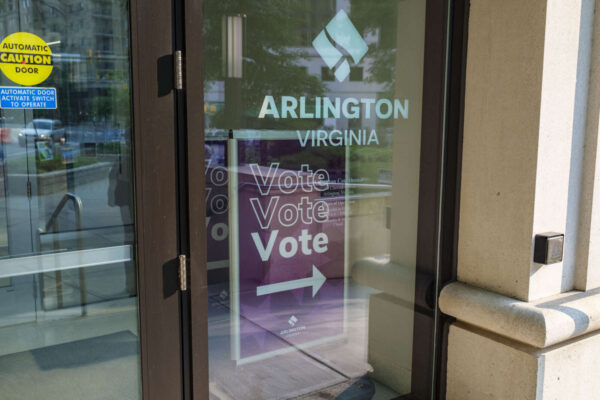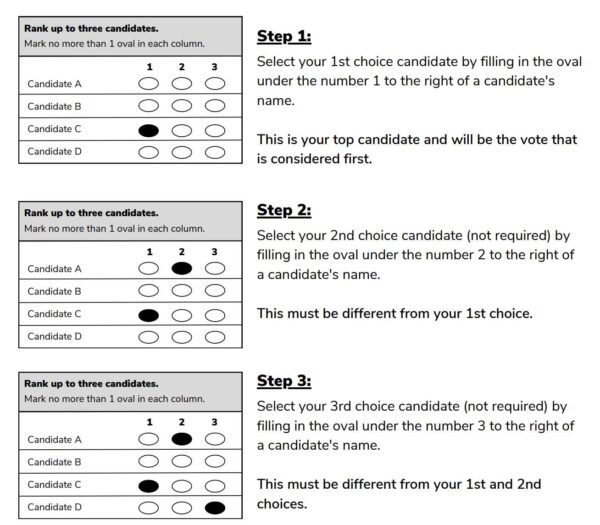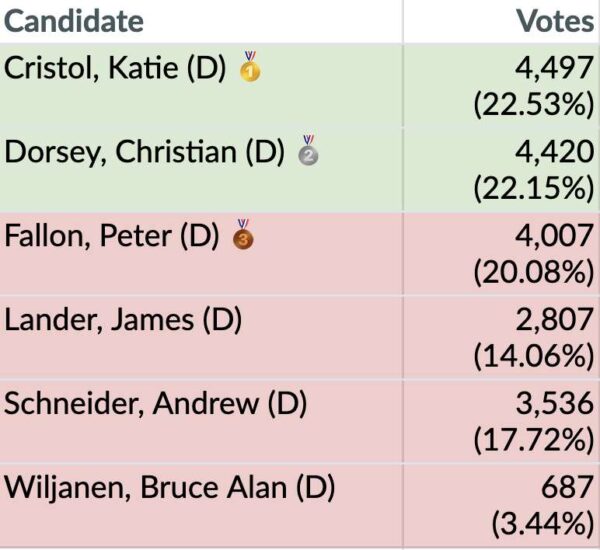
Just a few days remain to vote in the Arlington County Democratic primary.
Voters can cast their ballots early and in-person today (Friday) and tomorrow — or they can hit the polls on Tuesday.
This year, for the first time, residents are using ranked-choice voting to determine which Arlington County Board candidates will run with a (D) next to their names in the November general election. The format for every other primary contest is unchanged.
This article explains how to vote, how your vote is counted and why full results may come next weekend. At the minimum, this is what you should know:
- Anyone registered to vote, regardless of party, can participate in the primary.
- You can rank up to three of the six County Board candidates. You can only rank one or two if you want.
- Only two candidates will get the nomination.
- Only mark one oval per column and ask for assistance if you need help.
Filling out your ballot
Need a visual? This Arlington County flier provides step-by-step instructions:

The scanner will reject ballots that look as follows.

“Voters have the option to mark a new ballot or cast their ballot with the errors,” Arlington Dept. of Elections Director Gretchen Reinemeyer says. “A vast majority choose to spoil their original ballot and mark a new ballot.”
If you mailed in a ballot with errors, it will be reviewed.
“Their ballots are scanned after they are separated from the voter’s name to preserve voter privacy,” Reinemeyer says. “These ballots are held until election day and will be adjudicated by teams of election officers to determine voter intent.”
The rate of spoiled ballots so far this primary season is a little higher than normal, but still small, she noted. Final stats on spoiled ballots will be published after the election.
How are the winners picked?
Liz White, the executive director of UpVote Virginia, tells ARLnow she used this analogy to explain tabulation when her organization educated Arlingtonians on ranked-choice voting.
You have $1 to spend to elect someone. Everyone pays their first pick $1 and whoever gets the least amount of money is eliminated.
A candidate who wins by a large margin does not need the full $1 — just, for instance, 70 cents. Your second pick gets 30 cents.
If your first-place candidate is eliminated, your second-place pick gets your full $1. Everyone has a whole vote: for some, it is split among two and for others, it supports the second-place pick.
Armed with this knowledge, White says do not get too strategic.
“One of the nice things is that voters don’t have to be pundits,” she said. “They can truly say, ‘If I don’t have this one candidate, I want to have this one.'”
When will we know who won?
Knowing two winners on Tuesday is unlikely, however, one may emerge that night, with the second-place candidate revealed on Friday or Saturday.
To avoid confusion, Arlington County will sort all the provisional ballots and straggling mail-in ballots before calculating the official results, White says.
The delay is not a result of the tabulation system, but due to the different voting methods, says White.
“Tabulation is instantaneous,” she said.
Crossing the 33.3% rubicon
Sticking with the $1 analogy, in this race, voters have one full vote spread across two candidates instead of two votes to pick two victors.
White argues that, under the old model, the largest voting faction in Arlington determined which two candidates won. Now, it is more proportional.
The result of the 2015 Democratic primary show how a large field of candidates can divide up the vote. Katie Cristol and Christian Dorsey, the two departing the Board this year, won in 2015, but neither with more than 23% of the votes.
“Ranked-choice voting means, if you have 22% of vote — but that’s it, if that’s your narrow base and everyone else is not interested in electing you — you can’t win that race,” she said. “Whereas, in a traditional election, that could be enough.”


